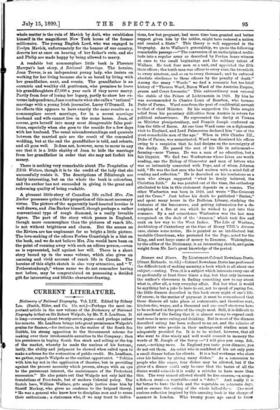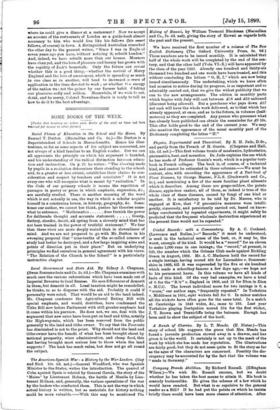Dinners and Diners. 13y Lieutenant-Colonel Newnham-Davis. (Grant Richards. 35. 6d.)
—Colonel Newnham.Davia has performed the difficult task of making amusing a book which is all about one subject,—eating. True, it is a subject which interests every one of us profoundly at least three times a day, but that only increases the author's cleverness in finding something new to say about what is, after all, a very everyday affair. Not but what it would be anything but a joke to have to eat, not to speak of paying for, the little dinners described in this book every night of one's life. Of course, in the matter of payment it must be remembered that these dinners all take place at restaurants, and therefore rent, kitchen-fire, wages, and a thousand and one small etceteras have to be reckoned in the price of the single meal. Still, it is difficult to rid oneself of the feeling that it is almost wrong to expend such vast sums in mere eating and drinking. But in most of the dinners described eating has been reduced to an art, and the salaries of the artists who preside in their underground studios must be adequately provided for. It is to be wished, however, that all who want to dine wisely and well would commit to memory the words of M. Joseph of the Savoy :—"I will give you soup, fish, roast,—nothing more. In England you taste your dinners, you do not eat them. An artist who is confident of his art only puts a small dinner before his clients. It is a bad workman who slurs over his failures by giving many dishes." As a concession to people who like sugar, four dishes may be allowed, but if the giver of a dinner could only be sure that the tastes of all the diners would coincide it is really a mistake to have more than this. The very utmost allowed should be five courses,—a soup— a fish—a meat—a vegetable—and a "doles." And really it is far better to have the fish and the vegetable on a.ternate dap, and so ensnre the eating of the whole bill-of-fa7a. The most curious reflection inspired by this amusing book is the change of manners in London. Who twenty years ago cared to know
where he could give a dinner at a restaurant ? Now we accept an account of the restaurants of London as a guide-book almost necessary to him who would live like his fellows (his smart fellows, of course) in town. A distinguished Australian remarked the other day to the present writer, "Since I was in Engle id seven years ago you have, without noticing it, rebuilt London." And, indeed, we have rebuilt more than our houses. Manners have elan zed, and the love of pleasure and luxury has grown with the rapidity of Jack's beanstalk. Only the future can revaal whether this is a good thing,—whether the revival of Merry England and the love of amusement, which is spreading as much in one class as in another, will tend to increased p mots of application in the time devoted to work ; or whether ti e energy of the nation wa not the gainer by our former habit .f taking our pleasures sadly and seldom. Meanwhile, if we wish to eat, chink, and be merry, Colonel Newnhaut-Davis is ready to tell us how to do it to the best advantage.







































 Previous page
Previous page